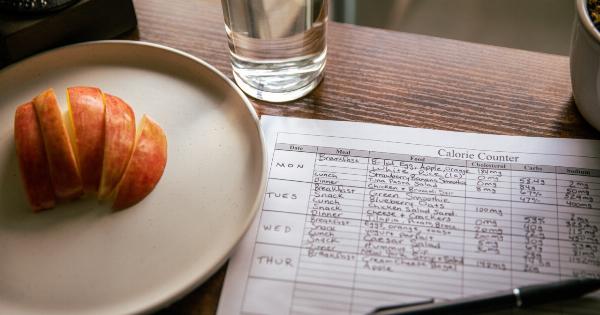Alcohol consumption is common in many cultures around the world. In fact, it is considered a socially acceptable way to relax and unwind after a long day at work or during social gatherings.
However, alcohol can negatively impact your weight loss goals, as well as your overall health. In this article, we will explore the ways alcohol affects your diet and weight loss goals and ways to minimize its negative impact.
Alcohol’s Effect on Metabolism
Alcohol is metabolized differently than other macronutrients like carbohydrates, proteins, and fats. Unlike other macronutrients, our bodies cannot store alcohol, which means that it must be metabolized and processed immediately.
This process occurs in the liver, where an enzyme called alcohol dehydrogenase (ADH) breaks down the alcohol into acetaldehyde, which is further broken down into acetate by another enzyme called aldehyde dehydrogenase (ALDH). Acetate is then turned into energy or stored as fat.
The process of metabolizing alcohol temporarily halts the metabolism of other macronutrients.
This means that all the carbohydrates, proteins, and fats consumed during and after alcohol consumption are temporarily stored as fat, preventing the body from burning them for energy.
Calorie Content of Alcohol
Alcohol is calorically dense, with 7 calories per gram of pure alcohol. This is more than the 4 calories per gram in carbohydrates and proteins, and only slightly less than the 9 calories per gram of fat.
Moreover, alcohol is often mixed with high-calorie mixers like sodas and juices, which can increase the calorie content of a single drink.
For example, a standard beer contains anywhere from 100-200 calories, while a glass of wine contains around 125 calories. Cocktails and other mixed drinks can contain much more – up to 500 calories per drink.
This means that consuming just a few drinks can easily add up to several hundred calories, which can quickly derail your weight loss goals.
Alcohol’s Effect on Appetite and Food Choices
Aside from its effect on metabolism and calorie content, alcohol can also affect your appetite and food choices. Alcohol has been shown to increase appetite and reduce inhibitions, which can lead to overeating and snacking on unhealthy foods.
In fact, studies have found that people who drink before or during their meals eat more food overall and are more likely to choose high-fat, high-carbohydrate foods over healthy options.
Besides the immediate impact on appetite and food choices, alcohol can also affect your sleep quality, leading to further unhealthy eating habits.
Poor sleep has been linked to an increased risk of obesity and metabolic disorders, as it disrupts the body’s natural circadian rhythm and hormone balance.
Reducing Alcohol’s Negative Impact
While it is best to limit or avoid alcohol altogether if you are trying to lose weight, it is not always practical or possible.
If you do choose to indulge in alcohol, here are some ways to minimize its negative impact on your diet and weight loss goals:.
1. Drink in moderation
The key is to drink in moderation and limit your consumption to no more than one drink per day for women and two drinks per day for men, as recommended by the National Institute on Alcohol Abuse and Alcoholism.
This means that you should avoid binge drinking and pace yourself throughout the night, sipping water between drinks to stay hydrated.
2. Make healthy drink choices
Choose healthier drink options that are lower in calories and sugar. For example, opt for wine or light beer instead of cocktails or sweetened mixed drinks.
You can also dilute your drink with water or soda water to make it last longer and reduce its calorie content.
3. Eat before or while drinking
Eating a balanced meal before or while drinking can help slow down the absorption of alcohol and reduce its impact on your metabolism and food choices.
Choose foods that are high in protein and fiber, which can help keep you fuller for longer and prevent overeating or snacking on unhealthy foods.
4. Track your alcohol intake
Keeping track of your alcohol intake can help you stay accountable and aware of how much you are drinking. You can use a smartphone app or a journal to keep track of your drinks and their calorie content.
5. Exercise regularly
Regular exercise can help counteract the negative impact of alcohol on your metabolism and weight loss goals. Exercise can help speed up your metabolism and burn off excess calories, helping you maintain a healthy weight even while drinking alcohol.
Conclusion
Alcohol can significantly impact your diet and weight loss goals, but it is not always necessary to give up completely.
By practicing moderation and adopting healthier drinking habits, you can still enjoy an occasional drink without sacrificing your health or weight loss goals. It is important to be aware of the calorie content and impact of alcohol on your metabolism, appetite, and food choices, and take steps to minimize its negative impact.





























